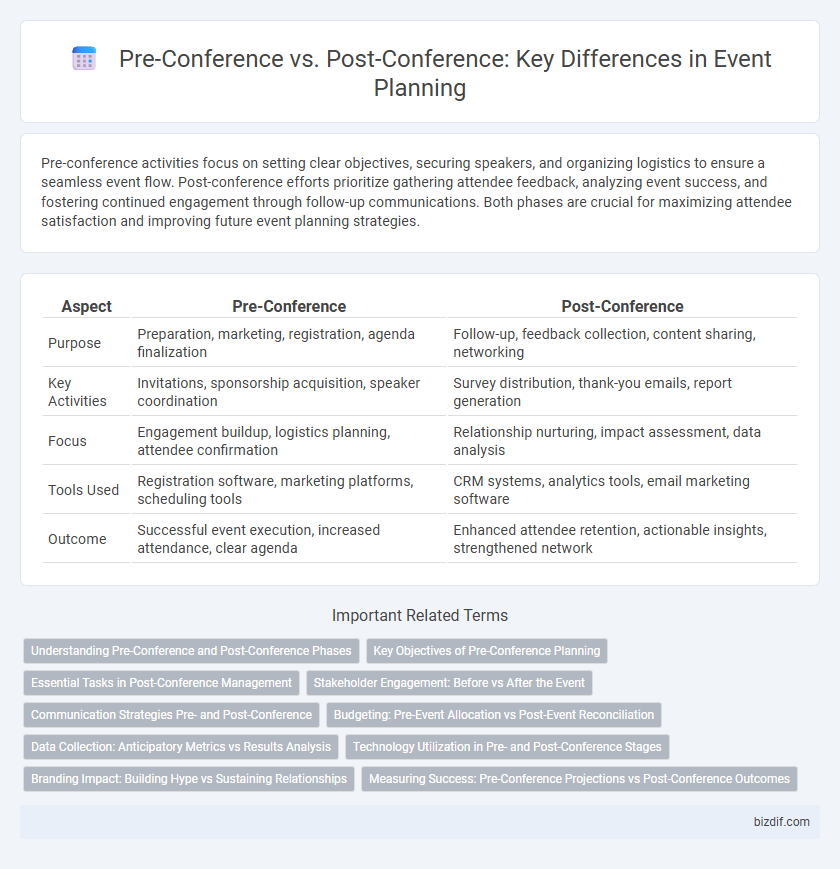Pre-conference activities focus on setting clear objectives, securing speakers, and organizing logistics to ensure a seamless event flow. Post-conference efforts prioritize gathering attendee feedback, analyzing event success, and fostering continued engagement through follow-up communications. Both phases are crucial for maximizing attendee satisfaction and improving future event planning strategies.
Table of Comparison
| Aspect | Pre-Conference | Post-Conference |
|---|---|---|
| Purpose | Preparation, marketing, registration, agenda finalization | Follow-up, feedback collection, content sharing, networking |
| Key Activities | Invitations, sponsorship acquisition, speaker coordination | Survey distribution, thank-you emails, report generation |
| Focus | Engagement buildup, logistics planning, attendee confirmation | Relationship nurturing, impact assessment, data analysis |
| Tools Used | Registration software, marketing platforms, scheduling tools | CRM systems, analytics tools, email marketing software |
| Outcome | Successful event execution, increased attendance, clear agenda | Enhanced attendee retention, actionable insights, strengthened network |
Understanding Pre-Conference and Post-Conference Phases
Pre-conference phases involve strategic planning, agenda setting, and speaker coordination to ensure a structured event outcome. Post-conference phases focus on data analysis, attendee feedback collection, and follow-up communication to maximize engagement and improve future events. Both phases are critical for comprehensive event lifecycle management and enhancing overall attendee experience.
Key Objectives of Pre-Conference Planning
Pre-conference planning focuses on setting clear goals, coordinating logistics, and securing speakers and sponsors to ensure a successful event. It involves detailed scheduling, marketing strategies, and attendee engagement preparation to maximize participation. Thorough pre-conference preparation helps minimize on-site issues and enhances overall conference effectiveness.
Essential Tasks in Post-Conference Management
Post-conference management includes essential tasks such as gathering attendee feedback, analyzing event performance metrics, and distributing conference materials to maintain engagement. Efficiently handling follow-up communications and addressing action items ensures long-term relationship building and maximizes the event's return on investment. Tracking post-event data supports continuous improvement for future conferences.
Stakeholder Engagement: Before vs After the Event
Pre-conference stakeholder engagement involves identifying key participants, setting expectations, and securing commitments through targeted communication and personalized outreach, ensuring alignment with event objectives. Post-conference engagement focuses on gathering feedback, maintaining relationships, and leveraging insights to drive continuous improvement and future collaboration. Effective stakeholder engagement at both stages enhances event impact and fosters long-term partnerships.
Communication Strategies Pre- and Post-Conference
Effective communication strategies before a conference include targeted email campaigns, social media updates, and personalized invitations to maximize attendee engagement and set clear expectations. Post-conference communication focuses on follow-up emails with session summaries, feedback surveys, and networking opportunities to maintain connections and gather insights for future events. Utilizing analytics tools to track engagement during both phases enhances message relevance and improves overall event impact.
Budgeting: Pre-Event Allocation vs Post-Event Reconciliation
Pre-conference budgeting requires precise allocation of funds to cover venue booking, speaker fees, marketing, and logistics, ensuring resources are efficiently distributed before the event. Post-conference reconciliation involves detailed auditing of actual expenses against the budget, identifying variances, and reallocating funds to address outstanding costs or unforeseen expenditures. Effective management of both phases optimizes budget accuracy and financial accountability in event planning.
Data Collection: Anticipatory Metrics vs Results Analysis
Pre-conference data collection emphasizes anticipatory metrics such as attendee registration trends, survey responses on expectations, and social media engagement, enabling proactive adjustments to event logistics and content. Post-conference data analysis focuses on results metrics including session attendance rates, participant feedback scores, and networking outcomes to assess event impact and inform future planning strategies. Leveraging both anticipatory and results data enhances event success through continuous improvement grounded in comprehensive metric evaluation.
Technology Utilization in Pre- and Post-Conference Stages
Technology utilization in pre-conference stages involves leveraging event management software for seamless registration, AI-driven agenda personalization, and virtual networking platforms to enhance attendee engagement before the event begins. Post-conference technology focuses on data analytics tools to measure attendee feedback, content management systems for sharing recorded sessions, and CRM integration to maintain ongoing communication and nurture leads. Efficient use of these technologies ensures improved event ROI and sustained participant interaction beyond the conference timeline.
Branding Impact: Building Hype vs Sustaining Relationships
Pre-conference activities maximize branding impact by creating anticipation and excitement through targeted marketing campaigns and teaser content that engages potential attendees early. Post-conference efforts focus on sustaining relationships by sharing event highlights, gathering feedback, and providing valuable follow-up content to reinforce brand loyalty. Both strategies are essential for comprehensive event branding, ensuring initial hype converts into long-term engagement.
Measuring Success: Pre-Conference Projections vs Post-Conference Outcomes
Pre-conference projections set benchmarks using attendee registration data, speaker confirmations, and expected engagement metrics to forecast event success. Post-conference outcomes analyze actual attendance rates, session feedback scores, and social media interactions to evaluate the event's impact. Comparing these metrics identifies gaps, informs future planning, and enhances overall event ROI.
Pre-conference vs post-conference Infographic

 bizdif.com
bizdif.com